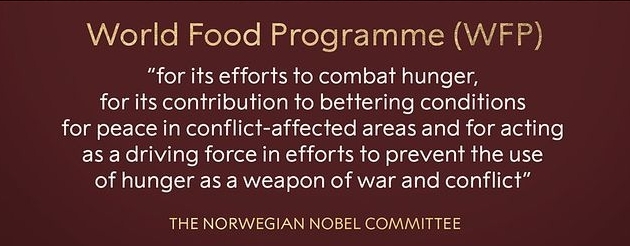As stated by the Norwegian Nobel Committee this year Nobel Peace Prize was awarded ‘for its efforts to combat hunger, for its contribution to bettering conditions for peace in conflict-affected areas and for acting as a driving force in efforts to prevent the use of hunger as a weapon of war and conflict’. Eight hundred fifteen million people worldwide suffer from malnutrition and the global pandemic situation may intensify this problem.
The Award Committee underlined the need to provide for food security in conflict-affected areas, where access to resources may be limited. Humanitarian context of the problem seems to be as important as the political one. Access to food and its fair distribution is also an economic challenge. Unsustainable food production and the problem of waste, especially in Western societies, constitute another dimension of the problem.
Progressing degradation of environment and related to it climatic changes affect agriculture. Unforeseen weather phenomena, including droughts and floods, make farming impossible, and the deteriorating situation forces local communities to migrate in search of better living conditions, increasing the problem of food shortages.
The problem of hunger is one of the biggest contemporary social challenges and an attempt at its elimination is the key priority. It has been reflected in Goal 2 of 2030 Agenda for the sake of sustainable development, adopted by United Nations in 2015. The goal to be achieved within the nearest 10 years by the international community includes: elimination of hunger, achieving food security and better nutrition as well as promoting sustainable agriculture.
Food security is associated with ensuring a sufficient amount of food, its availability and quality related to delivering a balanced meal. Food sovereignty that pays attention to the right of local communities to protect and regulate local production and trade constitutes a broader context.
For this purpose, a change of standards of production to the sustainable production is essential. It is necessary to pay attention to the local systems of production, strengthening indigenous production, protecting local resources and counteracting climate change.
By awarding the Peace Nobel Prize to an institution that deals with combating hunger in the world, the Committee underlined a problem we are a part of due to decisions that we take every day, our attitude to nature conservation, consumer decisions and attitude to food.
The world free from hunger and related to it conflicts, should be the banner of mankind. When discovering new fragments of Space, we should not forget about the basic human rights on Earth.
University of Lodz is one of the biggest universities in Poland. Its mission is to educate top-class scientists and specialists in numerous fields of humanities, social sciences, natural and exact sciences as well as health sciences. UniLodz cooperates with business, both at the staff level by providing qualified employees as well as at the scientific level, by offering its know-how to enterprises from various areas of economy. University of Lodz is an academic institution open to the world – the number of its international students is constantly growing, while its Polish students, thanks to Exchange programmes, get to know Europe, Asia and travel overseas. The University is a part of Lodz, it operates for and with the community of Lodz by getting involved in many socio-cultural projects.
Source: dr Agata Rudnicka, The Faculty of Management
Edit: Promotion Centre, UL

